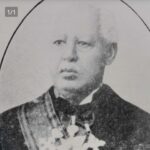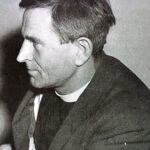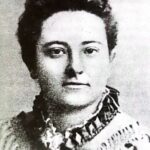
Afararq Gabra Iyasus (July 10, 1868-September 25, 1947), writer, poet and diplomat, was the author of Lebb wallad Tarik (“story Born out of Fantasy”) (1908), which may be regarded as the first modern Amharic novel.
Born on the Zage peninsula of Lake Tana, a center of traditional learning. Afawarq was related to the Empress Taytu Betul (q.v.), wife of Menilek II (q.v.). He was sent to Italy in 1887 as a member of a delegation, and studied painting at the Accademia Albertina di Belle Arti, Turin.
Upon returning to Ethiopia, he decorated the church of Raguel in Entoto, the former capital. In 1894 he returned to Europe with Alfred llg (q.v.). Menilek’s Swiss adviser, who took him to Switzerland, where he married one of IIg’s relatives. After a visit to Eritrea, he travelled to Italy where his second marriage too place, to an Italian, Eugenia Rissi, in 1904. Before this, he studied at the Collegio Internazionale. Turin, and in 1902 became assistant to Francesco Gallina, an Italian who held the chair in Amharic studies at the Oriental Institute in Naples. Afawarq wrote two grammers which were published in Rome under the sponsorship of Gallina, who also helped Afawarq with the final editing.
Afawarq’s novel Lebb wallad Tarik, maybe regarded as the first Ethiopian novel. His elegant and emphatic style, and the purity of his language, maintained even when confronted with typically Western ideas and forms of expression, won him an important place in the history of modern Ethiopian literature. His grammars, probably because the system of compilation currently accepted were unfamiliar to him, were characterized by a didactic and systematic viewpoint and a certain unconventionality of approach, but nevertheless offered a valuable source of information. He also published a guidebook (1908), which embodied many of his political and social ideas, and a biography of Menilek II (1909),
In 1912, he and his family moved to Asmara in Italian Eritrea to establish a business. In 1918 he visited the United States as head of a trade mission swnt by empress Zawditu (q.v.). He subsequently held a number of other posts, including those of director of customs (“Nagadras”) at Dire of Dawa (1922), and Ethiopian minister to Italy (1931-1935).
In 1925 he served as president of the special court established in Addis Ababa to settle disputes between Ethiopian nationals and foreigners, and during the Italian occupation (1935 – 1941) was appointed as Afa-Qesar, or chief of the Ethiopian court system. He also wrote many newspaper articles which showed his distinctive pro-Italian bias, and finally published a revised version of the son of David, juxtaposed with photographs and editorial comment praising the house of Savoy (Savoia), the ruling house, the ruling house of Italy from 1861-1947, and Benito Mussolini, Fascist dictator of Italy from 1922-1943. After the liberation of Ethiopia in 1941, he fell into disfavor on account of his collaboration with the invader, and was exiled to Jimma, in southwest Ethiopia, where he died blind in 1947.
LUIGI FUSELLA


